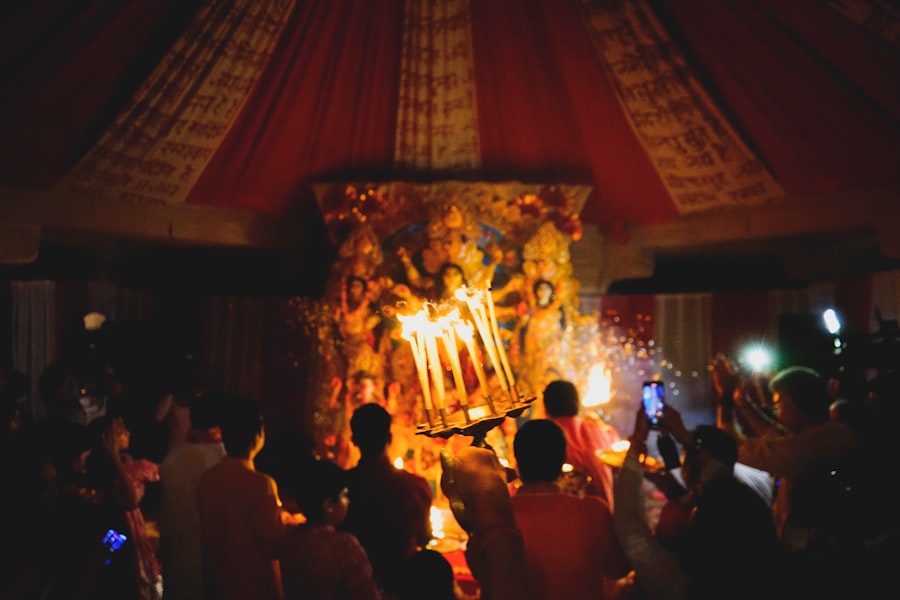In recent years, the term “spiritual cult” has gained significant attention, often evoking images of secretive gatherings and fervent followers. You may have encountered stories of individuals who have become ensnared in these groups, drawn in by promises of enlightenment, community, or a deeper understanding of life. Spiritual cults can be defined as organizations that often claim to offer unique spiritual insights or experiences, but they typically employ manipulative tactics to control their members.
Understanding the dynamics of these groups is crucial, especially if you or someone you know is at risk of becoming involved. The allure of spiritual cults often lies in their ability to provide a sense of belonging and purpose. In a world that can feel increasingly fragmented and isolating, the promise of a close-knit community can be irresistible.
However, beneath the surface, these groups often operate on principles that can lead to psychological and emotional harm. By examining the characteristics and behaviors associated with spiritual cults, you can better equip yourself to recognize the signs and protect yourself and your loved ones from potential exploitation.
Key Takeaways
- Spiritual cults often have unusual or extreme beliefs that set them apart from mainstream religions.
- Members of spiritual cults may be isolated from their family and friends in order to maintain control over them.
- Financial exploitation is common in spiritual cults, with members being pressured to donate large sums of money.
- Control and manipulation tactics are used to keep members obedient and loyal to the leader of the cult.
- There is often an excessive focus on the leader of the spiritual cult, with members expected to prioritize their needs and desires.
Unusual or Extreme Beliefs
One of the defining features of spiritual cults is their unusual or extreme beliefs that set them apart from mainstream religions or spiritual practices. You may find that these beliefs often revolve around a unique interpretation of spirituality, cosmology, or the nature of existence. For instance, some cults may promote the idea that they possess exclusive knowledge about the universe or humanity’s purpose, which can be incredibly appealing to those seeking answers in a chaotic world.
This exclusivity can create a sense of superiority among members, reinforcing their commitment to the group. Moreover, these beliefs can sometimes manifest in bizarre or irrational ways. You might encounter groups that advocate for extreme lifestyle changes, such as abandoning all material possessions or severing ties with non-believers.
Such practices can be alarming, as they often lead individuals to make significant sacrifices in their personal lives. The more extreme the beliefs, the more likely it is that members will become isolated from outside influences, further entrenching them in the cult’s ideology.
Isolation from Family and Friends

Isolation is a common tactic employed by spiritual cults to maintain control over their members. If you find yourself involved in such a group, you may notice that there is a concerted effort to distance you from your family and friends. This separation can be subtle at first, with members encouraging you to spend more time with fellow cultists and less with those who might question the group’s teachings.
Over time, this isolation can become more pronounced, as you may be discouraged from maintaining relationships with anyone who does not share the group’s beliefs. The impact of this isolation can be profound. You might feel a growing sense of loneliness and dependence on the group for emotional support and validation.
This dynamic can create a feedback loop where your need for acceptance within the cult reinforces your disconnection from your previous support system. As you become more entrenched in the group, it may become increasingly difficult to recognize the negative effects of this isolation on your mental health and overall well-being.
Financial Exploitation
| Types of Financial Exploitation | Signs of Financial Exploitation | Prevention Tips |
|---|---|---|
| Scams | Unexplained withdrawals or transfers | Monitor bank statements regularly |
| Identity Theft | Changes in wills or power of attorney | Shred personal documents before discarding |
| Abuse of Trust | Unpaid bills despite having enough funds | Stay informed about financial matters |
Financial exploitation is another alarming characteristic of many spiritual cults. If you are involved in such a group, you may find that there are constant demands for financial contributions or donations. These requests can range from voluntary offerings to mandatory fees for participation in rituals or events.
The pressure to give can be intense, as members are often led to believe that their financial sacrifices are necessary for their spiritual growth or the group’s mission. This financial burden can lead to significant hardships for individuals and their families. You might find yourself sacrificing personal savings or even going into debt to meet the group’s demands.
The cult’s leadership may use manipulative tactics to justify these financial expectations, framing them as acts of devotion or loyalty. As a result, you may feel trapped in a cycle of giving that leaves you financially vulnerable and emotionally drained.
Control and Manipulation
Control and manipulation are central to the functioning of spiritual cults. If you are part of such a group, you may notice that your thoughts and behaviors are increasingly dictated by the leadership. This control can manifest in various ways, including strict rules about daily activities, communication with outsiders, and even personal relationships within the group.
The leaders often position themselves as authorities on spiritual matters, creating an environment where questioning their decisions is discouraged. Manipulation tactics can also include gaslighting, where your perceptions of reality are challenged to make you doubt your own judgment. You might find yourself feeling confused or guilty for questioning the group’s teachings or practices.
This psychological manipulation serves to reinforce the leaders’ power and maintain control over members’ lives.
Excessive Focus on the Leader

In many spiritual cults, there is an excessive focus on a charismatic leader who is often viewed as infallible or divinely inspired. If you are involved in such a group, you may find yourself idolizing this leader and viewing them as the ultimate source of truth and guidance. This reverence can create an unhealthy dynamic where critical thinking is stifled, and dissenting opinions are silenced.
The leader’s authority becomes absolute, leaving little room for individual autonomy or personal growth. The consequences of this excessive focus on leadership can be detrimental to your sense of self-worth and identity. You might begin to measure your value based on your alignment with the leader’s teachings rather than your own beliefs and experiences.
This dependency can lead to feelings of inadequacy if you struggle to meet the leader’s expectations or if you begin to question their authority. Ultimately, this dynamic reinforces the cult’s control over its members while stifling personal development.
Pressure to Recruit New Members
Another hallmark of spiritual cults is the pressure placed on members to recruit new individuals into the group. If you find yourself in such an environment, you may feel an overwhelming sense of responsibility to share your beliefs with others, often under the guise of helping them achieve enlightenment or salvation. This pressure can create a sense of urgency within the group, as members are encouraged to view recruitment as a measure of their commitment and devotion.
The tactics used for recruitment can vary widely but often involve emotional appeals or manipulative strategies designed to exploit vulnerabilities in potential new members. You might find yourself participating in outreach efforts that prioritize quantity over quality, leading to relationships built on superficial connections rather than genuine understanding. This relentless pursuit of new recruits not only reinforces the group’s ideology but also perpetuates a cycle of dependency among existing members.
Lack of Transparency and Secrecy
A lack of transparency is a common characteristic of spiritual cults that can leave members feeling disoriented and confused. If you are involved in such a group, you may notice that information is often withheld from members or presented in a way that obscures its true meaning. This secrecy can create an atmosphere of distrust and suspicion, where questioning the group’s practices or beliefs is discouraged.
The absence of transparency can also extend to financial matters, decision-making processes, and even the leader’s background or qualifications. You might find yourself grappling with unanswered questions about the group’s origins or its long-term goals. This lack of clarity can foster an environment where misinformation thrives, making it difficult for members to make informed choices about their involvement in the group.
Psychological and Emotional Abuse
Psychological and emotional abuse are pervasive issues within many spiritual cults that can have lasting effects on individuals’ mental health and well-being. If you are part of such a group, you may experience manipulation tactics designed to undermine your self-esteem and sense of agency. This abuse can take many forms, including shaming tactics, public humiliation during group meetings, or emotional blackmail.
The impact of this abuse can be profound and far-reaching. You might find yourself struggling with anxiety, depression, or feelings of worthlessness as a result of your experiences within the cult. The emotional scars left by such abuse can linger long after leaving the group, making it essential to seek support from mental health professionals who understand the complexities of recovery from cult involvement.
Charismatic and Authoritarian Leadership
Charismatic leaders often play a pivotal role in attracting individuals to spiritual cults. If you have encountered such a leader, you may have been drawn in by their magnetic personality and persuasive communication style. These leaders often possess an uncanny ability to inspire loyalty and devotion among their followers, creating an environment where dissent is not tolerated.
However, this charisma can mask authoritarian tendencies that ultimately undermine individual autonomy within the group. You might find that decisions are made unilaterally by the leader without input from members, reinforcing a hierarchy that prioritizes obedience over critical thinking. This dynamic can create an unhealthy power imbalance that leaves members feeling powerless and dependent on the leader for guidance.
Steps to Take if You Suspect Involvement in a Spiritual Cult
If you suspect that you or someone you know may be involved in a spiritual cult, it is crucial to take proactive steps toward understanding and addressing the situation. First and foremost, educate yourself about the characteristics and behaviors associated with cults so that you can recognize red flags more easily. Engaging with literature on this topic or seeking out support groups for individuals who have left similar organizations can provide valuable insights.
Additionally, consider reaching out to trusted friends or family members who may have concerns about your involvement in the group. Open communication is essential for breaking down barriers created by isolation and manipulation tactics employed by cults. If possible, seek professional help from therapists who specialize in recovery from cult involvement; they can offer guidance tailored to your unique experiences.
By being aware of unusual beliefs, isolation tactics, financial demands, control mechanisms, excessive focus on leadership, recruitment pressures, secrecy, psychological abuse, charismatic leadership styles, and taking proactive steps if you suspect involvement in such groups, you empower yourself with knowledge that can lead to healthier choices and relationships moving forward.
When exploring the warning signs of a spiritual cult, it’s crucial to understand the psychological dynamics that can make individuals susceptible to such groups. A related article that delves into the psychological aspects of cult influence can be found on Unplugged Psychology’s website. This resource provides valuable insights into how cults manipulate beliefs and behaviors, often preying on individuals’ vulnerabilities. For a deeper understanding of these psychological mechanisms, you can read more about it in this article on Unplugged Psychology. This article offers a comprehensive look at the subtle tactics used by cults to exert control and the importance of recognizing these signs early.
WATCH NOW! 😱😱😱😱😱The Secret Psychology Cults Use on Anyone
FAQs
What are warning signs of a spiritual cult?
Some warning signs of a spiritual cult include a leader who demands unquestioning loyalty, isolation from friends and family, financial exploitation, and a focus on controlling members’ thoughts and behaviors.
How can I identify if a group is a spiritual cult?
You can identify if a group is a spiritual cult by looking for signs such as a leader who claims to have special powers or insights, a group that discourages questioning or critical thinking, and a group that uses fear or intimidation to keep members in line.
What are some red flags to look out for in a spiritual group?
Some red flags to look out for in a spiritual group include a leader who discourages members from seeking information outside of the group, a group that promotes a “us vs. them” mentality, and a group that uses deceptive recruitment tactics.
How can I protect myself from falling into a spiritual cult?
You can protect yourself from falling into a spiritual cult by staying informed about the warning signs, seeking advice from trusted friends or family members, and being cautious of groups that demand excessive time, money, or commitment.




